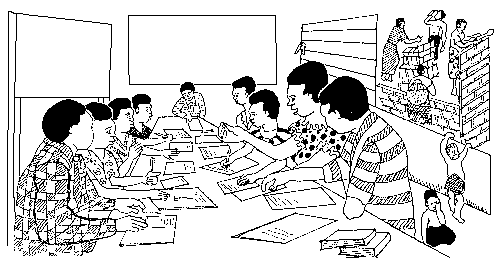Ebivvunuddwa:
'العربية / al-ʿarabīyah
Deutsch
Ewe
Filipino
Français
Galego
Italiano
日本語 / Nihongo
Kiswahili
بهاس ملايو / Bahasa Melayu
Português
Română
Af Soomaali
Tiếng Việt
اردو / Urdu
Other Pages:
Key Words
Modules
Sociology:
Home Page
Lecture Notes
Discussions
Utilities
Site Map
Contact
Utility Documents
Useful Links
Ebigambo ebisukufu ebitandika ne nyukuta W
by Phil Bartle
byakyusibwa Eric Bunnet Kitsa, Irene Nakasango, Jonathan Mwesigwa S.
WEALTH
Wealth is anything (goods or services) that has value. The amount of value is based on it being relatively scarce and relatively useful.
Shifting money about (transfer), in itself, does not create wealth, nor reduce poverty. Giving money to a poor person, repeated any number of times, does not solve the social problem of poverty. Wealth is created when value is added to the economy.
See IG, Poverty, Wealth.
Wealth belongs to the sixteen elements of strength, power or capacity of a community or organization. The degree to which the community as a whole (in contrast to individuals within it) has control over actual and potential resources, and the production and distribution of scarce and useful goods and services, monetary and non monetary (including donated labour, land, equipment, supplies, knowledge, skills).
The more wealthy a community, the stronger it is. (When greedy individuals, families or factions accrue wealth at the expense of the community or the organization as a whole, that weakens the community or organization). When stimulating a community to organize and act, the mobilizer needs to be aware of the role of wealth in empowering that community or organization.
See: Elements of Community Strength.
Bahasa Indonesia: kekayaan, Català: riquesa, Deutsch: Wohlstand, Ελληνικά: πλουτοσ, English: wealth, Español: riqueza, Français: richesse, Italiano: Ricchezza, Português: riqueza, Română: belșug, Srpski: bogatstvo, 中文 (Zhōngwén): 财富
WHOLE LANGUAGE
A reading approach that encompasses many different ways of teaching students to read.
The emphasis of the approach is on reading for meaning using good literature. See Large.
Whole language is a good example of learning from the “whole to its parts”. (Jac Slik)
Bahasa Indonesia: keutuhan bahasa, Català: llenguatge complet, Deutsch: Ganzwortmethode, Ελληνικά: γλωσσικο συνολο, English: whole language, Español: lenguaje completo, Français: l'approche globale, Italiano: Linguaggio globale, Română: limbaj complet, Srpski: čitav jezik, 中文 (Zhōngwén): 全语言
WORK PLAN
A work plan is a document describing how a project will be implemented, listing all actors and their responsibilities and roles, and all required tasks in the order and timing of their execution.
(A Work Plan is different from a Plan of Action or CAP).
Bahasa Indonesia: rencana kerja, Català: pla de treball, Deutsch: Arbeitsplan, Ελληνικά: σχεδιο εργασιασ, English: work plan, Español: plan de trabajo, Français: plan de travail, Italiano: piano di lavoro, Português: trabalhe plano, Română: plan de lucru, Srpski: plan rada, 中文 (Zhōngwén): 工作计划书
WORKSHOP
A "workshop" is a session that may be one or more days long.
Do not confuse it with a conference (which is to confer or discuss). A workshop is intended for work, and must have a planned output.
In a training workshop, the work is training, and the output should be among the five purposes of training indicated on this web site.
See "Preparing a Workshop."
 |
لعربيّة: ورشة العمل, Bahasa Indonesia: selebaran lokakarya, Català: taller, Deutsch: Workshop, Ελληνικά: Εργαστήρι, English: workshop, Español: taller, ارس کارگاه یا ور ک شاپ, Filipino: workshop, Français: atelier, Galego: taller, Italiano: Workshop, 日本語: ワークショップ, Português: seminário, Română: atelier de lucru, Pyccкий: Семинар, Srpski Radionica Türkçe: Atelye çalışması, ردو: ورکشاپ, 中文 (Zhōngwén): 工作坊
WORKSHOP HANDOUT
A "workshop handout" is a source of knowledge, skill and information that parallels a textbook for an institutional course of studies.
A handout is a training document, usually one or two pages long, which is a source of information for the participants to learn something.
We note that mobilisation is not something that can be learned once and for all, as when getting a degree or certificate. Because of that, people who already are working in the field can upgrade their skills and knowledge by attending a workshop.
العربيّة: ورشة العمل, Bahasa Indonesia: selebaran lokakarya, Català: fulletó informatiu, Deutsch: Arbeitsblatt, Ελληνικά: εκπαιδευτικο εγχειριδιο, English: workshop handout, Español: folleto de taller, Filipino: workshop, Italiano: opuscolo per workshop, Română: mapa de lucru, Pyccкий: семинар, Srpski: materijal za radionicu, 中文 (Zhōngwén): 工作坊的讲义教材
WORLDVIEW
A dimension of culture.
See Beliefs Conceptual Dimension.